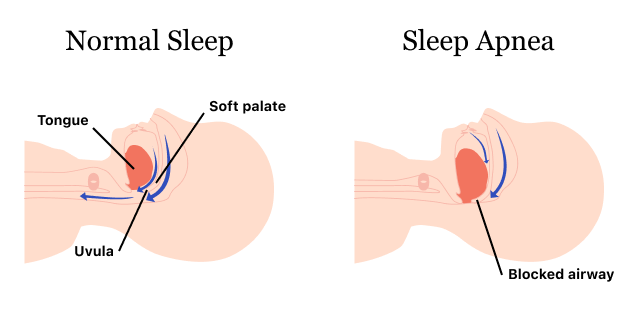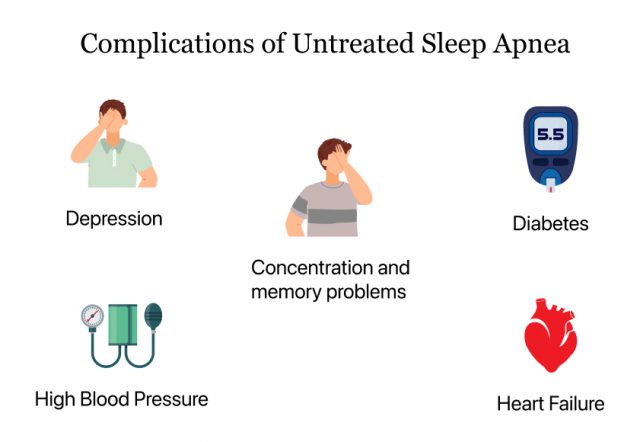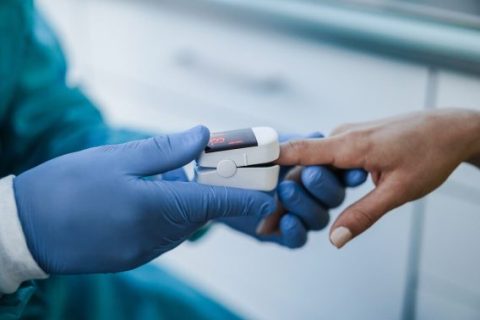Sleep Apnea
Sleep apnea is a disorder in which breathing repeatedly stops and starts during sleep. Obstructive sleep apnea is the most common type. Common symptoms of sleep apnea include daytime fatigue, brain fog and dry mouth. Untreated, sleep apnea can lead to other health problems.
What Is Sleep Apnea?
Sleep apnea is a serious but common sleep disorder marked by extended pauses in breathing that occur multiple times during sleep. Lapses in breathing cause a dip in the body’s oxygen and lead to poor sleep quality. Sleep apnea can affect children and women, but it’s most common in men.
There are two main types of sleep apnea: obstructive sleep apnea (OSA) and central sleep apnea and mixed sleep apnea. People with both types have mixed sleep apnea.
Most people have obstructive sleep apnea which is caused by the tongue, jaw or uvula shifting position during sleep and blocking the airway. Central sleep apnea happens when the brain fails to send signals to muscles responsible for breathing.

Symptoms of Sleep Apnea
Sleep apnea symptoms are caused by poor sleep quality and reduced oxygen in the body. Because these symptoms may mimic other health conditions, it’s important to check with your medical provider.
These symptoms may accompany signs — or evidence — of sleep apnea, such as reduced or absent breathing, loud snoring and choking or gasping for air while sleeping.
Breathing may stop for 10 seconds or more at a time, according to Dr. Jonathan Jun, a pulmonary and sleep medicine specialist at the Johns Hopkins Sleep Disorders Center.
- Decreased sex drive
- Depression or anxiety in women
- Dry mouth after waking up
- Hyperactivity in children
- Insomnia
- Morning headaches
- Problems with attention, concentration, memory and motor skills
- Sexual dysfunction
- Unusual sleepiness and fatigue during the day
- Waking up to urinate frequently
Though different things cause obstructive sleep apnea and central sleep apnea, they have many of the same symptoms and people need to see sleep specialists to get a proper diagnosis.
Left untreated, sleep apnea symptoms can get worse and lead to other health problems. Make sure you talk to your medical provider if you experience any signs or symptoms.
Causes and Risk Factors
Sleep apnea can be caused by various medical conditions or a person’s anatomy that lead to a blocked airway. People with OSA have blocked airways, while people with central sleep apnea have difficulty breathing during sleep because of faulty brain signals.
In addition, a person’s age, race, family history or lifestyle may increase the risk of developing sleep apnea.
- Being born with conditions such as smaller facial bones, cleft lip or palate or Down syndrome
- Certain medications that affect muscles or sleep patterns, such as opioids.
- Fluid build-up in the neck from kidney or heart failure
- Having large tonsils that narrow a person’s airway
- Medical conditions that disrupt signals from the brain to the chest muscles or airway, such as stroke, myasthenia gravis or Chiari malformations
- Obesity that increases neck fat deposits that obstruct the airway
- Premature birth that increases the risk of breathing problems caused by the brain
The risk for sleep apnea increases with age, family history of sleep apnea or being black, Hispanic or Native American. Poor lifestyle habits such as drinking too much alcohol, smoking or being overweight or obese can also increase your risk.
Being obese can cause obesity hypoventilation syndrome (OHS), a condition where excess weight makes it difficult for the chest muscles to properly expand to take in air quickly enough. This makes it harder for the brain to control breathing.
Screening for Sleep Apnea
Preventative screening for sleep apnea is usually done with questionnaires that ask about sleepiness, high blood pressure, snoring and other potential sleep apnea symptoms. Some medical providers may use these questionnaires to identify people at high risk of developing sleep apnea.
Currently, most primary care physicians don’t screen for OSA. If people discuss their symptoms with their physician, they will likely refer them to a specialist for diagnosis.
On Nov. 15, 2022, the U.S. Preventive Services Task Force published its sleep apnea screening recommendations in JAMA. The task force concluded that “The current evidence is insufficient to assess the balance of benefits and harms of screening for OSA in the general adult population.” This means the agency doesn’t recommend screening in adults with unrecognized symptoms of sleep apnea at this time.
Diagnosis
The gold standard for diagnosing sleep apnea is a sleep study. Patients will go to a special clinic that can monitor their breathing, brain function and muscle function while they sleep.
Before your medical provider will refer you to a sleep specialist or recommend a sleep study, they will examine you and ask you about your symptoms or any complications from untreated sleep apnea.
Make sure you come prepared to answer questions about your medical and family history.
- Medical History. Your doctor will review your medical history, such as family history, risk factors for sleep apnea and what signs and symptoms you are experiencing.
- Physical Exam. Your doctor will conduct a physical exam to check for conditions that can increase your risk, such as: Obesity, large neck circumference or a narrow airway.
- Sleep Study. If you have signs, symptoms and risk factors or sleep apnea, your doctor will recommend a sleep study to monitor blood oxygen levels, check brain activity, detect how many times your breathing stops or slows and check chest muscle function.
- Additional Tests. Tests to rule out other conditions such as hormone problems or medical conditions that could contribute to sleep apnea.
Treatment for Sleep Apnea
Treatments for sleep apnea include: continuous positive airway pressure (CPAP) or bi-level positive airway pressure (BiPAP) machines, lifestyles changes, oral devices or surgery. Sleep apnea treatment options depend on how severe sleep apnea is.
Specialists measure severity by how many apnea events — times you stop or have slow breathing — a person has per hour while sleeping. This measurement comes from a sleep study.
| Sleep Apnea Severity | Number of Apnea Events | Treatment Options |
| Mild | 5 to 14 apnea events per hour | CPAP, BiPAP, lifestyle changes, oral devices |
| Moderate | 15 to 29 apnea events per hour | CPAP, BiPAP, oral devices |
| Severe | 30 or more apnea events per hour | CPAP, BiPAP, surgery |
CPAP and BiPAP Machines
Continuous positive airway pressure (CPAP) or bi-level positive airway pressure (BiPAP) machines are machines that use pressurized air to keep airways open and help people breathe better during sleep. CPAP machines use the same air pressure when people breathe in and out, and BiPAP machines use less pressure when a person breathes out. CPAP devices are one of the main treatments for people with OSA and central sleep apnea. These machines are effective, but they take some time to get used to and some people quit using the machines.
Millions of people use Philips CPAP machines, and they are the largest CPAP maker in the world. But in June 2021, the FDA announced a Philips CPAP recall because sound abatement foam in the devices could degrade, enter the body and potentially cause cancer and other serious risks.
People who used recalled devices filed Philips CPAP lawsuits against the device maker because of cancer and other injuries.
Not all of Philips’ CPAP machines were recalled and other CPAP companies make machines that are still considered safe and effective.
Surgery
Doctors don’t typically recommend surgery for sleep apnea unless sleep apnea hasn’t responded to more conservative treatments such as CPAP. Possible complications include infection, bleeding, additional breathing problems and allergic reactions to anesthesia.
Surgeons can implant devices that keep the tongue, uvula or soft palate from blocking the airway. They can also remove tissue that blocks the airway or correct facial abnormalities that contribute to airway obstruction, such as part of the back of the tongue or the tonsils.
One 2021 article by Dr. Charles E. Morgan and colleagues suggests that surgical procedures have shown short-term benefits. But many studies suggest that the benefits vary by procedure and patient, especially in people with a higher body mass index.
Lifestyle Changes
Lifestyle changes are most effective for people with mild sleep apnea and can help reduce symptoms. Changes include: losing weight, reducing alcohol consumption and quitting smoking.
For example, one 2020 study published in Otolaryngology — Head and Neck Surgery showed that alcohol consumption was associated with worsening of snoring and low oxygen saturation in patients with OSA.
Another 2020 study in The Clinical Respiratory Journal found patients with severe OSA were heavy smokers and smoking increased OSA severity by reducing oxygen in the blood and increasing the apnea index.
Oral Devices
Oral devices are custom-made dental implants that help the jaw move forward and keep the tongue from blocking the airway. Patients insert them into their mouths when they go to sleep.
Examples of oral devices include mouth guards and tongue retaining devices. These devices are more effective for people with less severe sleep apnea.
What Are the Risks of Untreated Sleep Apnea?

Left untreated, sleep apnea can lead to more health problems. Lack of oxygen sends your body in high alert and increases heart rate and blood pressure.
“It’s very similar to that type of stress response. I would liken sleep apnea to something like that happening on a nightly basis,” explains Jun.
Constant oxygen fluctuations can lead to blood vessel and organ inflammation. If you have symptoms of sleep apnea, your doctor may check for these health conditions to help diagnose sleep apnea.
- Asthma
- Behavioral and cognitive disorders such as dementia in older adults and learning disabilities in children
- Cancer
- Glaucoma, dry eye and other eye disorders
- Heart attack or heart failure
- High blood pressure
- Irregular heartbeat called atrial fibrillation
- Kidney problems
- Mental health issues, such as depression
- Stroke, hardening of the arteries
- Type 2 diabetes, glucose intolerance and other metabolic disorders
Calling this number connects you with a Drugwatch representative. We will direct you to one of our trusted legal partners for a free case review.
Drugwatch's trusted legal partners support the organization's mission to keep people safe from dangerous drugs and medical devices. For more information, visit our partners page.



